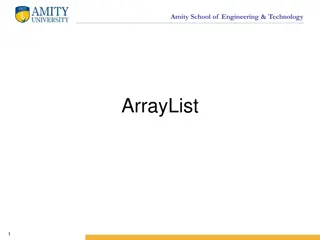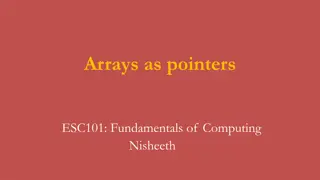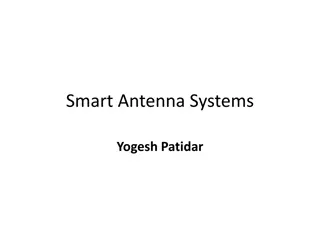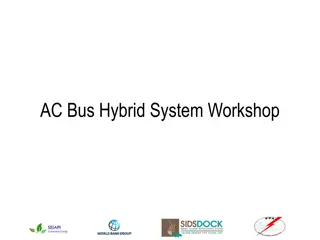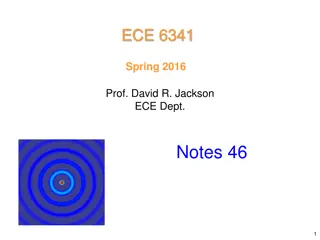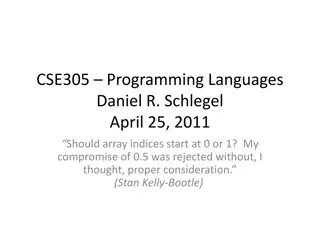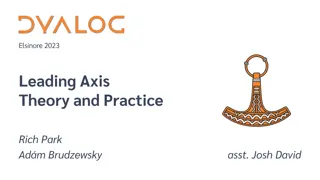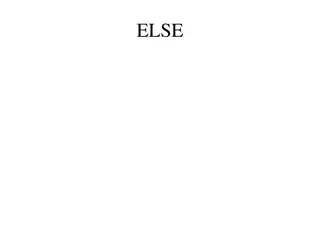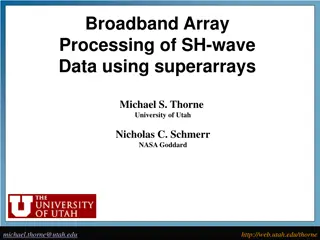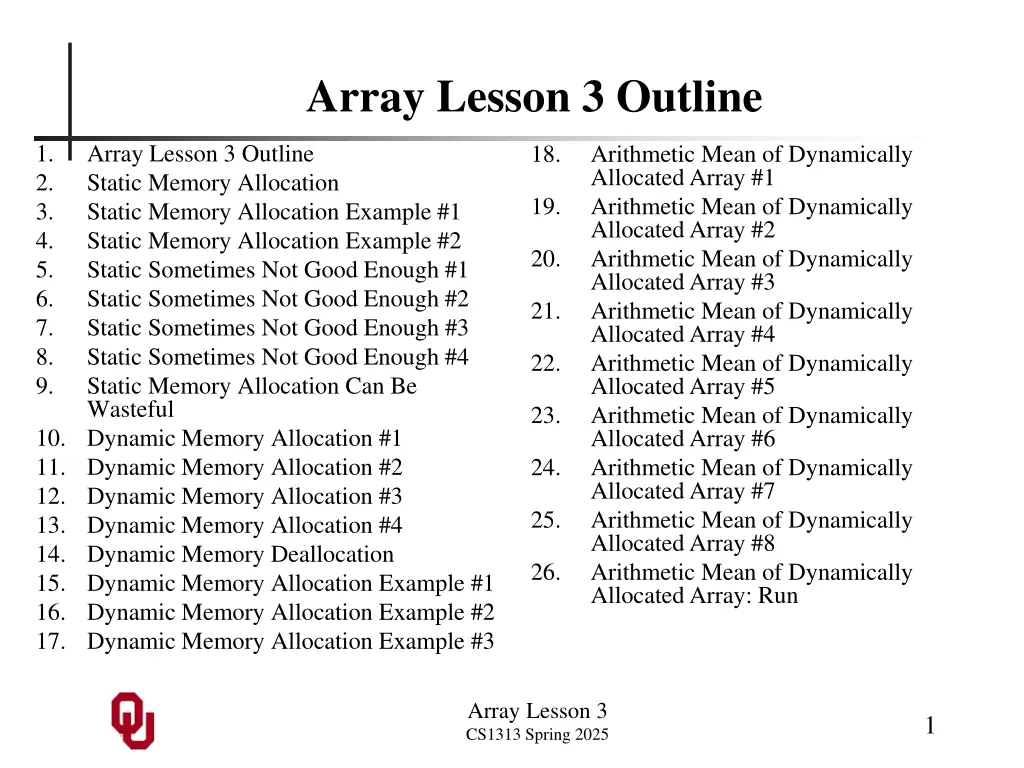
Dynamic Memory Allocation in Arrays: Understanding Static vs. Dynamic Allocation
Explore the concepts of static and dynamic memory allocation in arrays, including examples and considerations for when static allocation may not be sufficient. Learn how dynamic memory allocation provides flexibility for arrays with unknown sizes at compile time, improving memory usage efficiency.
Download Presentation

Please find below an Image/Link to download the presentation.
The content on the website is provided AS IS for your information and personal use only. It may not be sold, licensed, or shared on other websites without obtaining consent from the author. If you encounter any issues during the download, it is possible that the publisher has removed the file from their server.
You are allowed to download the files provided on this website for personal or commercial use, subject to the condition that they are used lawfully. All files are the property of their respective owners.
The content on the website is provided AS IS for your information and personal use only. It may not be sold, licensed, or shared on other websites without obtaining consent from the author.
E N D
Presentation Transcript
Array Lesson 3 Outline 1. 2. 3. 4. 5. 6. 7. 8. 9. Array Lesson 3 Outline Static Memory Allocation Static Memory Allocation Example #1 Static Memory Allocation Example #2 Static Sometimes Not Good Enough #1 Static Sometimes Not Good Enough #2 Static Sometimes Not Good Enough #3 Static Sometimes Not Good Enough #4 Static Memory Allocation Can Be Wasteful 10. Dynamic Memory Allocation #1 11. Dynamic Memory Allocation #2 12. Dynamic Memory Allocation #3 13. Dynamic Memory Allocation #4 14. Dynamic Memory Deallocation 15. Dynamic Memory Allocation Example #1 16. Dynamic Memory Allocation Example #2 17. Dynamic Memory Allocation Example #3 18. Arithmetic Mean of Dynamically Allocated Array #1 Arithmetic Mean of Dynamically Allocated Array #2 Arithmetic Mean of Dynamically Allocated Array #3 Arithmetic Mean of Dynamically Allocated Array #4 Arithmetic Mean of Dynamically Allocated Array #5 Arithmetic Mean of Dynamically Allocated Array #6 Arithmetic Mean of Dynamically Allocated Array #7 Arithmetic Mean of Dynamically Allocated Array #8 Arithmetic Mean of Dynamically Allocated Array: Run 19. 20. 21. 22. 23. 24. 25. 26. Array Lesson 3 CS1313 Spring 2025 1
Static Memory Allocation Up to now, all of the examples of array declarations that we ve seen have involved array sizes that are explicitly stated as constants (named or literal), and that therefore are known at compile time. We call this kind of array declaration static, because the size and location of the array are set by the compiler at compile time, and they don t change at runtime. Array Lesson 3 CS1313 Spring 2025 2
Static Memory Allocation Example #1 #include <stdio.h> int main () { /* main */ const int number_of_elements = 5; const int program_success_code = 0; int a[number_of_elements]; int count; for (count = 0; count < number_of_elements; count++) { a[count] = 2 * count; } /* for count */ for (count = 0; count < number_of_elements; count++) { printf("a[%2d] = %2d\n", count, a[count]); } /* for count */ return program_success_code; } /* main */ Array Lesson 3 CS1313 Spring 2025 3
Static Memory Allocation Example #2 % gcc -o array_for_mult array_for_mult.c % array_for_mult a[ 0] = 0 a[ 1] = 2 a[ 2] = 4 a[ 3] = 6 a[ 4] = 8 Array Lesson 3 CS1313 Spring 2025 4
Static Sometimes Not Good Enough #1 Often, we want to use an array or perhaps many arrays whose sizes aren t specifically known at compile time. Array Lesson 3 CS1313 Spring 2025 5
Static Sometimes Not Good Enough #2 #include <stdio.h> #include <stdlib.h> int main () { /* main */ const int minimum_number_of_elements = 1; const int maximum_number_of_elements = 15; const int program_failure_code = -1; const int program_success_code = 0; int a[maximum_number_of_elements]; int number_of_elements; int count; printf("How long will the array be (%d to %d)?\n", minimum_number_of_elements, maximum_number_of_elements); scanf("%d", &number_of_elements); if ((number_of_elements < minimum_number_of_elements) || (number_of_elements > maximum_number_of_elements)) { printf("That s not a valid array length!\n"); exit(program_failure_code); } /* if ((number_of_elements < ...) || ...) */ Array Lesson 3 CS1313 Spring 2025 6
Static Sometimes Not Good Enough #3 for (count = 0; count < number_of_elements; count++) { a[count] = 2 * count; } /* for count */ for (count = 0; count < number_of_elements; count++) { printf("a[%2d] = %2d\n", count, a[count]); } /* for count */ return program_success_code; } /* main */ Array Lesson 3 CS1313 Spring 2025 7
Static Sometimes Not Good Enough #4 % gcc -o array_for_mult_read array_for_mult_read.c % array_for_mult_read How long will the array be (1 to 15)? 5 a[ 0] = 0 a[ 1] = 2 a[ 2] = 4 a[ 3] = 6 a[ 4] = 8 Array Lesson 3 CS1313 Spring 2025 8
Static Memory Allocation Can Be Wasteful If the size of an array or at least the number of elements that we want to use isn t known at compile time, then we could allocate an array that s at least as big as the biggest array that we could imagine needing. Of course, we might imagine that number to be pretty big. And we might have several, or many, such big arrays. On the one hand, memory is very cheap these days. On the other hand, we might reach the point where we can t have the several arrays we want, because we need too many arrays, each of which might need to be big. But, what if we could allocate space for our arrays at runtime? Array Lesson 3 CS1313 Spring 2025 9
Dynamic Memory Allocation #1 Dynamic memory allocationmeans allocating space for an array at runtime. To use dynamic memory allocation, we have to declare our array variable, not as a static array, but rather as a pointerto an array of the same data type: float* list1_input_value = (float*)NULL; Notice that, when we declare the array pointer, we initialize it to the nullmemory location, which means that the pointer doesn t point to anything (yet). Presently, we ll talk about why we do that (but not yet). Array Lesson 3 CS1313 Spring 2025 10
Dynamic Memory Allocation #2 We use the malloc function ( memory allocate ) to allocate the array at runtime, once we know its length: list1_input_value = (float*)malloc(sizeof(float) * number_of_elements); The (float*) is called a type cast, which we won t go into detail about right now. You MUST use it when you use malloc. When the malloc function is called, it returns a pointer to a location in memory that is the first byte of the first element of an array whose size is the number of elements of the array that is being allocated, times the size (in bytes) of each of the elements that is, exactly enough bytes to fit the array being allocated. Array Lesson 3 CS1313 Spring 2025 11
Dynamic Memory Allocation #3 list1_input_value = (float*)malloc(sizeof(float) * number_of_elements); Notice the sizeof function; it returns the number of bytes in a scalar of the given data type. For example, on an Intel/AMD x86 computer under the gcc compiler, sizeof(float) returns 4. Array Lesson 3 CS1313 Spring 2025 12
Dynamic Memory Allocation #4 After the call to malloc: If the allocation is UNsuccessful, then the pointer will still be null. If the allocation is successful, then the pointer will be something other than null. list1_input_value = (float*)malloc(sizeof(float) * number_of_elements); if (list1_input_value == (float*)NULL) { printf("ERROR: the attempt to allocate\n"); printf(" first input array failed.\n"); exit(program_failure_code); } /* if (list1_input_value == (float*)NULL) */ The check of the pointer variable s value MUST occur IMMEDIATELY AFTER the call to malloc (similar to idiotproofing). Array Lesson 3 CS1313 Spring 2025 13
Dynamic Memory Deallocation Dynamic memory DEallocationmeans freeing up the space for an array that has been dynamically allocated at runtime. Often, this is done at the end of the program, though not always. In C, the deallocate command is named free. For example, to deallocate a float array named list1_input_value, do this: free(list1_input_value); list1_input_value = (float*)NULL; Notice that, after deallocating the array pointed to by list1_input_value, we also have to set list1_input_value to NULL. We refer to this as nullifyingthe pointer. Array Lesson 3 CS1313 Spring 2025 14
Dynamic Memory Allocation Example #1 #include <stdio.h> #include <stdlib.h> int main () { /* main */ const int minimum_number_of_elements = 1; const int program_failure_code = -1; const int program_success_code = 0; float* array = (float*)NULL; int number_of_elements; int count; printf("How long will the array be (at least %d)?\n", minimum_number_of_elements); scanf("%d", &number_of_elements); if (number_of_elements < minimum_number_of_elements) { printf("That's not a valid array length!\n"); exit(program_failure_code); } /* if (number_of_elements < minimum_number_of_elements) */ Array Lesson 3 CS1313 Spring 2025 15
Dynamic Memory Allocation Example #2 array = (float*)malloc(sizeof(float) * number_of_elements); if (array == (float*)NULL) { printf("ERROR: the attempt to allocate\n"); printf(" array failed.\n"); exit(program_failure_code); } /* if (array == (float*)NULL) */ for (count = 0; count < number_of_elements; count++) { array[count] = 2.5 * count; } /* for count */ for (count = 0; count < number_of_elements; count++) { printf("array[%2d] = %4.1f\n", count, array[count]); } /* for count */ free(array); array = (float*)NULL; return program_success_code; } /* main */ Array Lesson 3 CS1313 Spring 2025 16
Dynamic Memory Allocation Example #3 % gcc o array_for_mult_read_dynamic array_for_mult_read_dynamic.c % array_for_mult_read_dynamic How long will the array be (at least 1)? 0 That s not a valid array length! % array_for_mult_read_dynamic How long will the array be (at least 1)? 5 array[ 0] = 0.0 array[ 1] = 2.5 array[ 2] = 5.0 array[ 3] = 7.5 array[ 4] = 10.0 Array Lesson 3 CS1313 Spring 2025 17
Arithmetic Mean of Dynamically Allocated Array #1 #include <stdio.h> #include <stdlib.h> int main () DON T COPY-AND-PASTE! { /* main */ const float initi l_sum = 0.0; const int minimum_number_of_elements = 1; const int first_element = 0; const int program_success_code = 0; const int program_failure_code = -1; float* list1_input_value = (float*)NULL; float* list2_input_value = (float*)NULL; float list1_input_value_sum, arithmetic_mean1; float list2_input_value_sum, arithmetic_mean2; int number_of_elements; DON T COPY-AND-PASTE! int e ement; Array Lesson 3 CS1313 Spring 2025 18
Arithmetic Mean of Dynamically Allocated Array #2 pr ntf(" 'm going to calculate the arithmetic mean of\n"); printf(" a pair of lists of values that you input.\n"); printf("These lists will have the same length.\n"); Array Lesson 3 CS1313 Spring 2025 19
Arithmetic Mean of Dynamically Allocated Array #3 printf("How many values would you like to\n"); printf(" calculate the arithmetic mean of in each list?\n"); scanf("%d", &number_of_elements); f (number_of_elements < minimum_number_of_elements) { printf( "ERROR: Can't calculate the arithmetic mean of %d values.\n", number_of_elements); DON T COPY-AND-PASTE! exit(program_failure_code); } /* if (number_of_elements < minimum_ umber_of_elements) */ Array Lesson 3 CS1313 Spring 2025 20
Arithmetic Mean of Dynamically Allocated Array #4 list1_input_value = (float*)malloc(sizeof(float) * number_of_elem nts); if (list1_input_value == (float*)NULL) { printf("ERROR: Can't allocate the 1st float array\n"); printf(" of length %d.\n", number_of_elements); exit(program_failure_code); } /* if (list1_input_value == (float*)NULL) */ list2_input_value = (float*)malloc(sizeof(float) * number_of_elements); if (list2_input_value == (float*)NULL) { printf("ERROR: Can't allocate the 2nd float array\n"); printf(" of length %d.\n", number_of_elements); exit(program_failure_code); } /* if (list2_input_value == (float*)NULL) */ Array Lesson 3 CS1313 Spring 2025 21
Arithmetic Mean of Dynamically Allocated Array #5 printf("What are the pair of lists of %d values each\n", number_of_elements); printf(" to calculate the arithmetic mean of?\n"); for (element = first_element; element < number_of_elements; eleme t++) { scanf("%f %f", DON T COPY-AND-PASTE! &list1_input_value[element], &list2_input_value[element]); } /* for element */ DON T COPY-AND-PASTE! Array Lesson 3 CS1313 Spring 2025 22
Arithmetic Mean of Dynamically Allocated Array #6 list1_input_value_sum = initial_sum; for (element = first_element; element < number_of_elements; element++) { list1_input_value_sum = list1_input_value_sum + list1_input_v lue[element]; } /* for element */ arithmetic_mean1 = list1_input_value_sum / number_of_elements; list2_input_value_sum = initial_sum; for (element = first_element; element < number_of_elements; element++) { list2_input_value_sum = list2_input_value_sum + list2_input_value[element]; } /* for element */ arithmetic_mean2 = list2_input_value_sum / number_of_elements; Array Lesson 3 CS1313 Spring 2025 23
Arithmetic Mean of Dynamically Allocated Array #7 printf("The %d pairs of input values are:\n", number_of_elements); for (element = first_element; element < number_of_elements; element++) { printf("%f %f\n", list1_input_value[el ment], list2_input_value[element]); } /* for element */ DON T COPY-AND-PASTE! printf("The arithmetic mean of the 1st list of %d input values is %f.\n", number_of_elements, arithmetic_mean1); printf("The arithmetic mean of the 2nd list of %d input values is %f.\n", number_of_elements, arithmetic_mean2); Array Lesson 3 CS1313 Spring 2025 24
Arithmetic Mean of Dynamically Allocated Array #8 free(list2_input_value); list2_input_value = (float*)NULL; free(list1_input_value); DON T COPY-AND-PASTE! list1_input_value = (float*)NULL; return program_success_code; } /* mai */ Array Lesson 3 CS1313 Spring 2025 25
Arithmetic Mean of Dynamically Allocated Array: Run % gcc -o arithmetic_mean_dynamic arithmetic_mean_dynamic.c % arithmetic_mean_dynamic I'm going to calculate the arithmetic mean of a pair of lists of values that you input. These lists will have the same length. How many values would you like to calculate the arithmetic mean of in each list? 5 What are the pair of lists of 5 values each to calculate the arithmetic mean of? 1.1 11.11 2.2 22.22 3.3 33.33 4.4 44.44 9.9 99.99 The 5 pairs of input values are: 1.100000 11.110000 2.200000 22.219999 3.300000 33.330002 4.400000 44.439999 9.900000 99.989998 The arithmetic mean of the 1st list of 5 input values is 4.180000. The arithmetic mean of the 2nd list of 5 input values is 42.217999. Array Lesson 3 CS1313 Spring 2025 26




